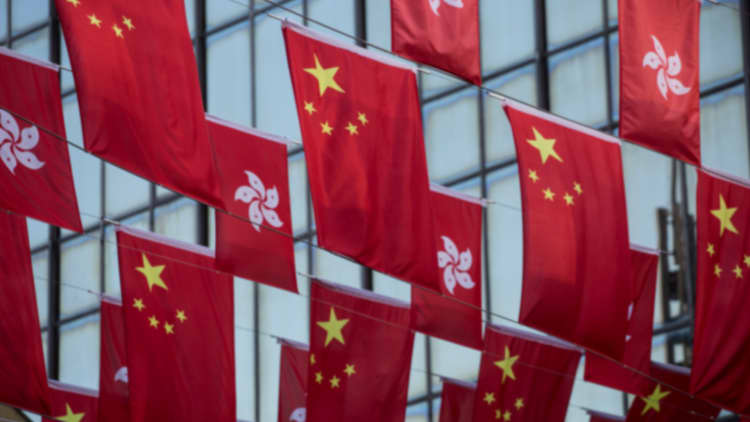The months-long protests in Hong Kong could come to an end soon, according to strategist David Roche, who said they will "be settled or crushed" before October 1 — the 70th anniversary of China's National Day.
The way China responds to the situation in the city is crucial in determining how markets and U.S.-China trade talks will be affected, he told CNBC on Friday.
In fact, the politics go hand in hand with the Chinese economy, Roche said.
"I don't accept this will be a small scale problem in a larger China economy. The reason I don't is because I believe any intervention (from Beijing) to Hong Kong will be immediately, umbilically, linked to what happens to trade talks and international relations globally," said Roche, who is president at research and investment consulting firm Independent Strategy.
Roche said "Beijing has to weigh in on two things: the political and economic cause."
Economic impact
On Thursday, Hong Kong's government announced that it has lowered its 2019 GDP growth forecast to between 0% and 1%, from the original range of 2% to 3%.
The protests over an extradition bill have spilled over into issues of freedoms and democracy, are almost into their third month and have crippled the Asian financial hub.
Various sectors have reportedly been affected, and markets are said to be hit hard as demonstrations turn increasingly violent. Most notably, the airline, retail, real estate sectors have seen their sales decline, while the city's public transit system has also been disrupted on multiple occasions.
Ray Dalio, founder of investment firm Bridgewater Associates, said that the protests have "gone beyond a demonstration," and has become "a revolution in Hong Kong."
"It's disruptive, and has global geopolitical implications," he told CNBC's Christine Tan on "Managing Asia."
However, the situation would only be a "medium-sized risk" for China's economy, Dalio said, pegging the risk level at a 3 or 4, on a scale of one to 10. From a larger perspective, Hong Kong is just a "tiny place" in a "very big vibrant economy" that is China.
Meanwhile, Wall Street has not yet priced in the events in Hong Kong at this point, according to Tim Seymour, chief investment officer at Seymour Asset Management. He echoed Roche's sentiments and warned investors to be on alert for the impact, particularly on the economies in Asia.
"Wall Street doesn't recognize the distraction this could be for any trade resolution," Seymour told CNBC on Friday.

Trade talks 'to get worse'
On Wednesday, Trump tweeted that he suggested a "personal meeting" with China's President Xi Jinping over the Hong Kong crisis.
But Roche said he doesn't think the meeting will happen.
He said that Beijing is already irritated by the U.S. telling Chinese authorities "how to run their country," in reference to Hong Kong and Taiwan affairs. If the U.S. continues in that behavior, Beijing's frustrations will reflected in the trade talks, according to Roche.
Investors' biggest fear would come true "if trade talks are extended into covering political matters in Hong Kong," said Roche.
"That is exactly why the trade talks are going to get worse," he said.
— CNBC's Weizhen Tan contributed to this report.


